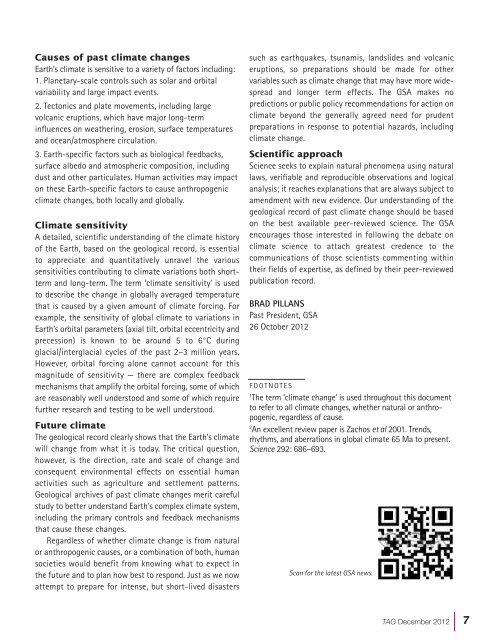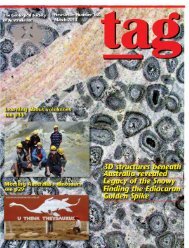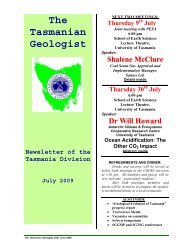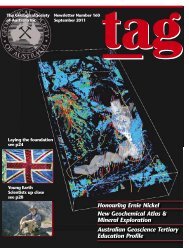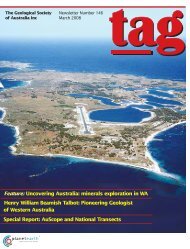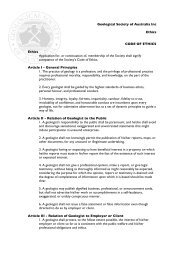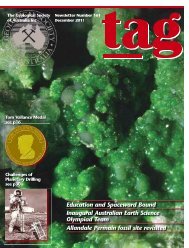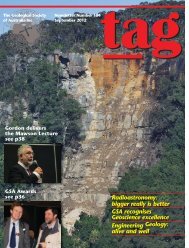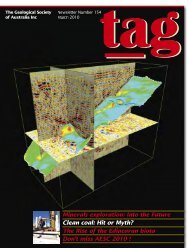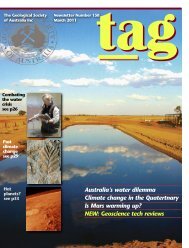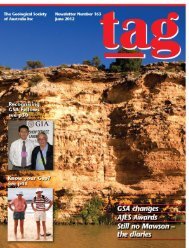TAG - Geological Society of Australia
TAG - Geological Society of Australia
TAG - Geological Society of Australia
Create successful ePaper yourself
Turn your PDF publications into a flip-book with our unique Google optimized e-Paper software.
Causes <strong>of</strong> past climate changesEarth’s climate is sensitive to a variety <strong>of</strong> factors including:1. Planetary-scale controls such as solar and orbitalvariability and large impact events.2. Tectonics and plate movements, including largevolcanic eruptions, which have major long-terminfluences on weathering, erosion, surface temperaturesand ocean/atmosphere circulation.3. Earth-specific factors such as biological feedbacks,surface albedo and atmospheric composition, includingdust and other particulates. Human activities may impacton these Earth-specific factors to cause anthropogenicclimate changes, both locally and globally.Climate sensitivityA detailed, scientific understanding <strong>of</strong> the climate history<strong>of</strong> the Earth, based on the geological record, is essentialto appreciate and quantitatively unravel the varioussensitivities contributing to climate variations both shorttermand long-term. The term ‘climate sensitivity’ is usedto describe the change in globally averaged temperaturethat is caused by a given amount <strong>of</strong> climate forcing. Forexample, the sensitivity <strong>of</strong> global climate to variations inEarth’s orbital parameters (axial tilt, orbital eccentricity andprecession) is known to be around 5 to 6°C duringglacial/interglacial cycles <strong>of</strong> the past 2–3 million years.However, orbital forcing alone cannot account for thismagnitude <strong>of</strong> sensitivity — there are complex feedbackmechanisms that amplify the orbital forcing, some <strong>of</strong> whichare reasonably well understood and some <strong>of</strong> which requirefurther research and testing to be well understood.Future climateThe geological record clearly shows that the Earth’s climatewill change from what it is today. The critical question,however, is the direction, rate and scale <strong>of</strong> change andconsequent environmental effects on essential humanactivities such as agriculture and settlement patterns.<strong>Geological</strong> archives <strong>of</strong> past climate changes merit carefulstudy to better understand Earth’s complex climate system,including the primary controls and feedback mechanismsthat cause these changes.Regardless <strong>of</strong> whether climate change is from naturalor anthropogenic causes, or a combination <strong>of</strong> both, humansocieties would benefit from knowing what to expect inthe future and to plan how best to respond. Just as we nowattempt to prepare for intense, but short-lived disasterssuch as earthquakes, tsunamis, landslides and volcaniceruptions, so preparations should be made for othervariables such as climate change that may have more widespreadand longer term effects. The GSA makes nopredictions or public policy recommendations for action onclimate beyond the generally agreed need for prudentpreparations in response to potential hazards, includingclimate change.Scientific approachScience seeks to explain natural phenomena using naturallaws, verifiable and reproducible observations and logicalanalysis; it reaches explanations that are always subject toamendment with new evidence. Our understanding <strong>of</strong> thegeological record <strong>of</strong> past climate change should be basedon the best available peer-reviewed science. The GSAencourages those interested in following the debate onclimate science to attach greatest credence to thecommunications <strong>of</strong> those scientists commenting withintheir fields <strong>of</strong> expertise, as defined by their peer-reviewedpublication record.BRAD PILLANSPast President, GSA26 October 2012F O O T N O T E S1The term ‘climate change’ is used throughout this documentto refer to all climate changes, whether natural or anthropogenic,regardless <strong>of</strong> cause.2An excellent review paper is Zachos et al 2001. Trends,rhythms, and aberrations in global climate 65 Ma to present.Science 292: 686–693.Scan for the latest GSA news.<strong>TAG</strong> December 2012| 7


